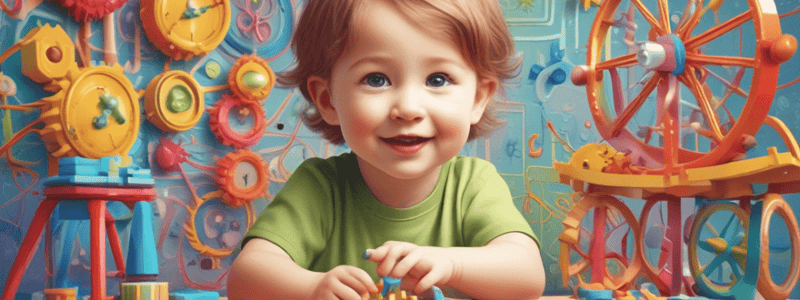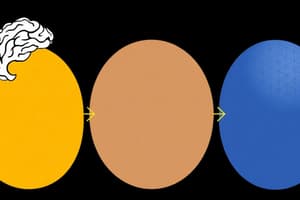Podcast
Questions and Answers
What term did Piaget coin to describe the intentional performance of motor experiments by children?
What term did Piaget coin to describe the intentional performance of motor experiments by children?
- Random handling
- Directed groping (correct)
- Deliberate fumbling
- Accidental touching
What is a common behavior that demonstrates children's growing awareness of object permanence?
What is a common behavior that demonstrates children's growing awareness of object permanence?
- Reaching for briefly hidden toys (correct)
- Avoiding missing objects
- Ignoring hidden objects
- Playing with visible toys only
What skill do children begin to develop during the sensorimotor stage to reach distant targets?
What skill do children begin to develop during the sensorimotor stage to reach distant targets?
- Spatial awareness
- Use of tools like sticks or strings (correct)
- Directed movement
- Abstract thinking
How do infants and toddlers lay the groundwork for future intellectual growth according to the text?
How do infants and toddlers lay the groundwork for future intellectual growth according to the text?
What is an example of a purposeful action children start doing as they understand object permanence better?
What is an example of a purposeful action children start doing as they understand object permanence better?
What is the primary way children explore the world in the sensorimotor stage?
What is the primary way children explore the world in the sensorimotor stage?
Which milestone signifies the child's realization that objects continue to exist even when not visible?
Which milestone signifies the child's realization that objects continue to exist even when not visible?
What are the primary instincts driving infants at the start of the sensorimotor stage?
What are the primary instincts driving infants at the start of the sensorimotor stage?
Which ability do infants gain as they progress through the sensorimotor stage?
Which ability do infants gain as they progress through the sensorimotor stage?
What does object permanence mean in the context of Piaget's sensorimotor stage?
What does object permanence mean in the context of Piaget's sensorimotor stage?
Which milestone serves as the basis for further exploration and understanding of the environment in the sensorimotor stage?
Which milestone serves as the basis for further exploration and understanding of the environment in the sensorimotor stage?
Flashcards are hidden until you start studying
Study Notes
Piaget's Stage Theory: The Sensorimotor Stage
Jean Piaget's theory of cognitive development identifies the sensorimotor stage as the foundation of a child's intellectual and emotional growth, spanning roughly from birth to the age of 2. During this initial stage, children rely primarily on their senses and motor abilities to explore the world around them, gaining knowledge through hands-on interaction and exploration. Let's delve into some key aspects of the sensorimotor stage:
Infant Learning Process
At the beginning of the sensorimotor stage, infants are primarily driven by instinctive reflexes like sucking and looking. Over time, they gradually develop control over their motor functions, enabling them to grasp, crawl, walk, and coordinate their eyes with their hands. These milestones serve as the basis for further exploration and understanding of the environment.
Developing Object Permanence
One of the most crucial achievements in the sensorimotor stage is the development of object permanence. This concept signifies a child's realization that objects continue to exist even when they are not visible, audible, or otherwise present. Young infants may fail to comprehend this, reacting with shock or indifference when an object disappears temporarily. However, as children grow older, they become increasingly aware of object permanence and display actions consistent with this understanding, such as reaching for toys that are briefly hidden or searching for a missing object after it is removed from sight.
Monitoring Motor Experiments
As children become more adept at using their motor skills, they begin engaging in directed groping, a term coined by Piaget to describe the intentional performance of motor experiments to understand the outcomes of various actions. During this stage, children start to perform purposeful searches for lost objects and discover ways to reach distant targets with the assistance of tools like sticks or strings.
In summary, the sensorimotor stage marks the critical foundation for a child's cognitive development. Through hands-on interactions and exploratory behaviors, infants and toddlers lay the groundwork for future intellectual growth and refine their understanding of the world around them.
Studying That Suits You
Use AI to generate personalized quizzes and flashcards to suit your learning preferences.




